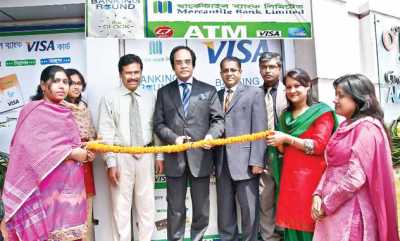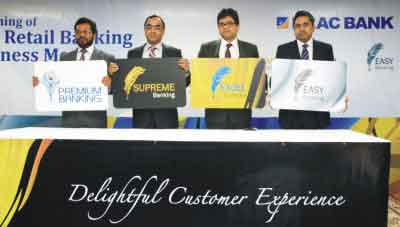Banking
Mercantile Bank opens ATM booth at Rampura
 AKM Shahidul Haque, Managing Director and CEO of Mercantile Bank, inaugurates an ATM booth at Rampura Branch at West Rampura in Dhaka.
AKM Shahidul Haque, Managing Director and CEO of Mercantile Bank, inaugurates an ATM booth at Rampura Branch at West Rampura in Dhaka.
Mercantile Bank Limited opened its 41st ATM booth at Rampura branch, West Rampura in Dhaka.
AKM Shahidul Haque, Managing Director and CEO of the Bank inaugurated the booth, according to a press release received on Wednesday.
While inaugurating the booth, Shahidul Haque said that the residents dwelling at Rampura area will benefit from the advanced banking service as the booth will provide them with 24 hours cash withdrawal facility.
The Daily Sun/Bangladesh/ 3rd May 2012
IMF rejects call to cut ties with Iran
WASHINGTON: The International Monetary Fund yesterday rejected a call by a US anti-Iran group for it to cut its relations with Tehran's central bank in order to adhere to US and European sanctions.
The IMF said its account with Bank Markazi is simply related to Iran's membership in the IMF and does not contravene sanctions placed on Tehran to pressure it not to develop nuclear weapons.
The advocacy group United Against Nuclear Iran, a group of US ex- diplomats and government officials, said that the IMF needed to shut down its account with Bank Markazi, a specific target of the sanctions, or suspend Iran's membership in the fund.
The Daily Sun/Bangladesh/ 3rd May 2012
BTMC shares 53pc of classified loans
State-run Bangladesh Textile Mills Corporation (BTMC) shares 53.86 percent of the total classified loans that 38 public entities owed to five state-owned commercial and specialised banks till March this year.
The state-owned banks are—Sonail Bank, Janata Bank, Agrani Bank, Rupail Bank and Basic Bank.
Meanwhile, Bangladesh Petroleum Corporation (BPC) owes state-run banks around Tk 18.38 billion as of March 12, more than 50 percent of the total outstanding loans (Tk 33.15 billion) of 38 government entities to the state banks, Bangladesh Bank (BB) data shows.
The amount of classified loans of state-owned enterprises from the state-run commercial banks stood at Tk 2.97 billion at the end of March 2012, down from Tk 3.25 billion at the end of July last year.
BTMC’s total outstanding loan is Tk 1.75 billion, of which Tk 1.59 billion is classified, BB sources said.
“We are trying our best to clear the default loans and already paid back Tk 2 billion” BTMC Chairman Brig General Mahmood Ul Alam told daily sun yesterday.
“I do not think the BTMC is still the top defaulter among the government institutions as we have repaid a portion of the debt,” he added.
Bangladesh Chemical Industry Corporation (BCIC), which is the second top defaulter among the 38 state-owned companies, owes Tk 904.60 million to different state-owned banks.
Of its total outstanding loans, state-run BPC owes the highest Tk 7.11 billion to Sonail Bank, followed by Tk 5.90 billion to Agrani Bank, Tk 4.50 billion to Janata Bank and Tk 4.20 billion to Rupail Bank.
Bangladesh Power Development Board (BPDB) also has an outstanding loan of Tk 1.67 billion with different state banks.
Besides, seven state-run enterprises in manufacturing sector share 88.49 percent of total classified loans of 38 state-owned enterprises as of March 2012.
The International Monetary Fund (IMF) has tagged a condition to its one-billion-dollar credit that the government would halt further loans to BPC, BPDB and BCIC from the state-run banks from fiscal 2014-2015.
“It is a dreadful performance of the current government to run an enterprise like BTMC without solving its financial crisis,” Dr Mirza Azizul Islam, former adviser to caretaker government, said.
The Daily Sun/Bangladesh/ 3rd May 2012
BRAC Bank retools retail banking
 Syed Mahbubur Rahman, managing director of BRAC Bank, attends the launch of the bank's new retail banking model at Sonargaon Hotel in Dhaka yesterday.
Syed Mahbubur Rahman, managing director of BRAC Bank, attends the launch of the bank's new retail banking model at Sonargaon Hotel in Dhaka yesterday.
BRAC Bank yesterday launched its new retail banking model to provide more customised and convenient services to fulfil the requirement of its customers.
Under the model, the Bank introduced four segments: Premium, Supreme, Excel and Easy.
The Bank will deploy dedicated service desk at branches to meet requirement of individual customers.
Syed Mahbubur Rahman, managing director and chief executive officer of BRAC Bank, launched the banking model at a press meet at Sonargaon Hotel in Dhaka.
“BRAC Bank has always brought in pioneering initiatives in the banking industry with technology and innovation for the benefit of customers,” said Rahman.
He said the launching of the banking model is a step forward towards customer-focused banking and a milestone in the banking industry.
“As a member of sustainable banking group -- Global Alliance for Banking on Values -- we are committed to provide value-based banking that puts prime focus on the needs of the customers,” said Rahman.
He said the Bank will know customers better, understand their needs and design products accordingly and serve them better.
This is the first time in Bangladesh that a Bank introduces customer-centric model where customers will get benefit of demand-driven banking service instead of supply-driven one, the Bank said in a statement.
This is a major shift in traditional banking industry in Bangladesh towards value-based banking with focus on designing products and services as per financial needs of individual customer, according to the statement.
Mohammad Mamdudur Rashid, deputy managing director, and Firoz Ahmed Khan, head of retail banking, were also present.
The Daily Star/Bangladesh/ 3rd May 2012
Asia to surpass Europe, US in wealth by 2030, says ADB
Southeast Asian nations, China and India together may surpass the US and Europe combined in terms of wealth by 2030 if the Asian economies take quick steps to overcome challenges and reduce risks, according to a new book.
“The Asean is the hub of Asian regionalism. China is the world's most populous country and the second largest economy. India is rapidly catching up, and has the second largest population," the book says.
"Asean, the PRC, and India: The Great Transformation?" was released by the Asian Development Bank and Asian Development Bank Institute in Manila yesterday, the Bank said in a statement.
The book envisions that realising this goal would require that each improve productivity through innovation and new technologies, establish knowledge-driven economies, build seamless infrastructure connectivity and reform the financial sector.
“These three region and countries are on a path to significantly improve the quality of life of their citizens -- in aggregate approaching half of the world's population by 2030,” ADB President Haruhiko Kuroda said at the book launching ceremony.
The programme took place during the 45th annual meeting of ADB's Board of Governors at San Miguel Hall of Philippine International Convention Centre, Manila.
“By that time, China could reach high-income country status, while the Asean as a whole and India would be close behind. The three could be home to the world's leading consumers, producers, savers, investors and financiers,” he said.
The book said the three economies will have to depend increasingly on their own and regional markets, investments, and institutions to generate sustained growth.
Without inclusive growth, widening income and social inequality are likely to persist and could undermine social cohesion and stability, according to the book.
Strengthening governance, accountability, institutional effectiveness and eradicating corruption are crucial for inclusive growth and better quality of life, it stated.
The book predicted that unless the challenges of energy and water security and reduction of CO2 emissions are addressed, these could amplify global environmental risks and geopolitical tensions.
To meet their potential, each economy will need to manage energy, food, and water effectively, balancing growth with environmental sustainability, it said.
The Daily Star/Bangladesh/ 3rd May 2012



